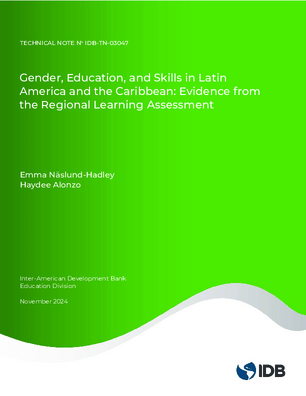Gender, Education, and Skills in Latin America: Evidence from the Regional Learning Assessment
Date issued
Nov 2024
Subject
Children;
Test Score;
Teaching of Mathematics;
Education;
Teacher;
Educational Institution;
Learning;
Gender Segregation;
Gender Gap;
Educational Evaluation
JEL code
I21 - Analysis of Education;
I24 - Education and Inequality
Category
Technical Notes
Latin America has achieved considerable progress in expanding access to education, yet significant gender disparities persist in educational outcomes. These gaps are evident in enrollment, completion rates, and performance across key subjects such as mathematics, language, and science. This study explores the multifaceted drivers of these disparities, including societal norms, family expectations, and economic conditions that differentially impact boys and girls.
Using data from the 2019 Regional Comparative and Explanatory Study (ERCE), the analysis highlights persistent gender-based achievement gaps across Latin American countries. Girls typically outperform boys in language and science, while boys excel in mathematics. However, these trends vary across demographic groups, with Indigenous students facing compounded barriers. Indigenous girls score lower in mathematics compared to Indigenous boys and non-Indigenous peers, while Indigenous boys underperform in language and science relative to their counterparts. The findings indicate that observable factors, such as access to resources, do not fully account for these disparities. Instead, societal expectations, parental perceptions, and cultural attitudes toward education emerge as critical drivers.
Using data from the 2019 Regional Comparative and Explanatory Study (ERCE), the analysis highlights persistent gender-based achievement gaps across Latin American countries. Girls typically outperform boys in language and science, while boys excel in mathematics. However, these trends vary across demographic groups, with Indigenous students facing compounded barriers. Indigenous girls score lower in mathematics compared to Indigenous boys and non-Indigenous peers, while Indigenous boys underperform in language and science relative to their counterparts. The findings indicate that observable factors, such as access to resources, do not fully account for these disparities. Instead, societal expectations, parental perceptions, and cultural attitudes toward education emerge as critical drivers.
NO



